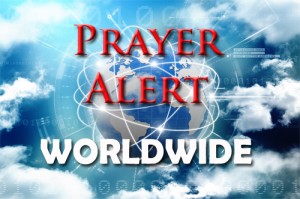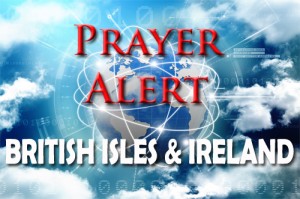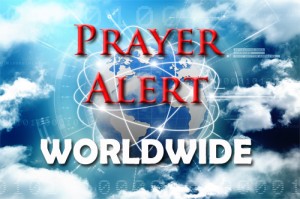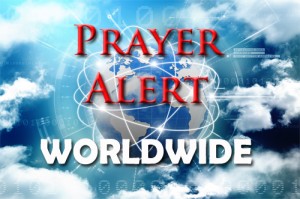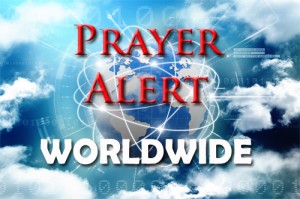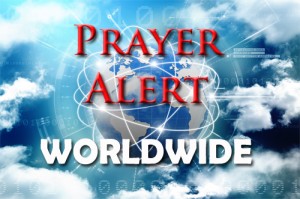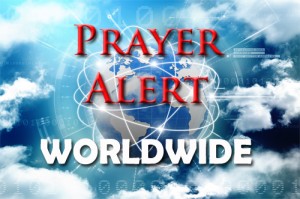Displaying items by tag: Nigeria
Nigeria: Fulani conflict escalates
Africa's Sahara desert is increasingly encroaching upon traditional farmlands. Muslim Fulani herdsmen, the largest nomadic tribe in Africa, are desperate for grazing land and water for their cattle, but farmers can't tolerate their crops being eaten, trampled, and destroyed by those cattle. This conflict for survival gives rise to violence. The mainly Christian Nigerian farmers have no defence against marauding herdsmen wielding guns and machetes. The central Christian area of Nigeria was once the main target, but with increasing desert encroachment, more areas are targeted. The Fulani are now even more of a threat than Boko Haram insurgents. Farmers are being slaughtered, and some are considering abandoning their farms. AK-47 assault rifles from the conflicts in neighbouring Libya and Mali come across porous borders. A recent anti-grazing law has failed to stop the Fulani. President Muhammadu Buhari, a Fulani, has ordered military crackdowns on them. Pray for God to destroy their sources and stockpile of weapons.
North Africa: mass losses at sea
Some 126 refugees drowned in the Mediterranean after Libyan people-smugglers stole their outboard motor, leaving them at the mercy of the waves and other attackers. The dinghy, which left from a beach in Libya on 16 June, was heading toward Italy when it was attacked. The waves soon engulfed the dinghy and it sank. It is believed there were 130 on board, of whom four (two Nigerians and two Sudanese) were rescued by passing fishermen. Most of the passengers were from Sudan. A spokesman for the UN migration agency said the incident was ‘tantamount to murder’. He added, ‘We believe the motor may even have been stolen by the smugglers who launched the dinghy in the first place, or a rival group. Many motors have been stolen in recent times as they are valuable to the smugglers.’
Praising God with 60,000 live worshippers
So far, more than 60,000 people worldwide have watched a one-hour Instagram live video that begins daily at midnight for people to praise God, tagged as the #HallelujahChallenge. Nigerian gospel artist Nathaniel Bassey began hosting the session on 1 June to just over a thousand people, urging Christians to join him in worship for a month. Helped by the promotion of numerous popular Nigerian artists, Bassey (who describes himself on his Twitter page as an ‘authentic Jesus lover’) tweeted, ‘It is a revival and a revolution. JESUS is in charge!’ It is thought to be the most widely-circulated praise and worship movement on social media. Bassey said, ‘The Challenge is a mandate from God, and I am just a vessel. Beyond all the miracles and testimonies, God is doing something eternal - something that will outlive generations.’
Nigeria: 82 Chibok girls released
On Sunday the Bring Back Our Girls Group (BBOG) applauded the federal government and security agencies on the release of 82 more Chibok girls. Their release was negotiated through the combined efforts of security agencies, the military, the Swiss government, the Red Cross, and local and international NGOs. 21 girls had been set free last October, and the government committed to rescuing the 113 girls who are still captive. A spokesperson for the Young Women Political Forum urged the ministry of women’s affairs and the ministry of health to work together to provide the girls and their parents with adequate psychological counselling. Pray that communities will accept these victims of rape, who are now mothers with babies and no husbands. See also the Prayer Alert world article 3.
Global: 20 million close to starvation
In February Prayer Alert readers were told of 1.4 million children at risk of starvation in Yemen, South Sudan, Somalia, and northeast Nigeria. The crisis has worsened. Millions of people are caught in conflicts within their countries. Livelihoods are disrupted, and they cannot produce food. This is a God-sized situation that requires intercession and His intervention. The UN needs $4.4 billion by July to prevent famine in these countries. An official said the organisation is facing its largest humanitarian crisis since its creation. Without the funding and collective and coordinated global efforts, people will simply starve to death. Yemen's needs are the most critical: two-thirds of the population (19 million) need assistance. In South Sudan, 7.5 million need help. In Somalia and northeastern Nigeria there is also severe food insecurity because of violence and instability. See also
Nigeria: Chibok girls - what awaits the ones set free?
The ordeal of being kidnapped by Boko Haram does not end with their release. It is the start of a long struggle back into family and community life. The Chibok ‘children’ who have been freed are now young women. An already fraught transition from adolescence to womanhood has been complicated by their captivity. They will be reunited briefly with families over the coming days. There will be tearful reunions and a mixture of emotions, as both parents and daughters will have changed a great deal over the past three years. Then the young women will go through a process of reintegration or rehabilitation. This is either government care or government custody, depending on the need. Some families support the process;, others are angry that they will not have their daughters back even after they have been released from Boko Haram.
Nigeria: prayers and action are needed
Hundreds of Christians and other religious minorities in central Nigeria have been killed by Fulani militia. Men, women and children are being murdered, their land taken away and their homes destroyed. The number of attacks has increased dramatically, with at least twelve more lives lost in an attack during a vigil service on Easter Saturday. This crisis demands urgent action. Christian Solidarity Worldwide are urging people to request the Governor of Kaduna State, Nasir el Rufai, to protect Christians and other religious minorities and to do everything he can to help those who are being attacked by the militia. They haven’t done anything wrong. They just want to live their lives in peace, something the constant attacks make impossible. Also ask God to hear the prayers of his people and protect non-Muslim communities, which have been suffering attacks since 2010.
Easter violence
Egypt has had three days of mourning after two bombings of Coptic Christian churches by IS on Palm Sunday, killing 49 and injuring dozens. In response to the attacks, Egypt will set up a supreme council to counter terrorism and extremism. At the end of March Israel reported, ‘Egypt is likely to be subject to an IS terror attack in the near future.’ Eitan Ben-David, head of Israel's counter-terror bureau, said, ‘We don't want to cry wolf but we really believe that the threat is serious.’ In many countries, particularly Nigeria, Easter prompts heightened tension between Christians and Muslims. Nigerian churches will be overwhelmingly full, and Easter Monday is a holiday with crowds gathering at markets, beaches, etc. Historically Nigeria has experienced horrendous Easter church bombings. Other countries also experience Christian / Muslim tensions at Easter. In Pakistan last Easter, 75 were killed and 340 injured in Christian-targeted bombings. See also
Nigeria: this food is not for you
What makes you angry? I'm not talking about that frustration you feel when you've just missed a train, or your computer crashes - I'm talking about the kind of deep anger that rages against the injustice we see in our fallen world. When I heard about the situation facing our church family in northern Nigeria, that's how I felt - angry and sad. There is a humanitarian crisis in the region, leaving millions on the brink of starvation. This is bad enough in itself. But thousands of Christians, who have already been forced to flee their homes to escape Islamic fundamentalists, are frequently being denied access to the vital aid that they need to survive by local leaders, simply because of their faith in Jesus. Some of our brothers and sisters have been eating leaves - they had nothing else to eat.
Nigeria: meningitis outbreak
An outbreak of meningitis has been reported in six Nigerian states, infecting over a thousand and killing 140. Meningitis causes acute inflammation of the brain and spinal cord. The current outbreak is the worst since 2009, when over 150 people died. The disease is spreading; it could become out of control if refugee camps, prisons and police cells become affected through crowds. Vaccination is a way of preventing meningitis. However a new strain imported from a neighbouring country is now prevalent and requires a different vaccine. The outbreak, attributed to cold nights / dusty winds / dry weather, is aggravated by traditional beliefs, poor hygiene, and overpopulation.
